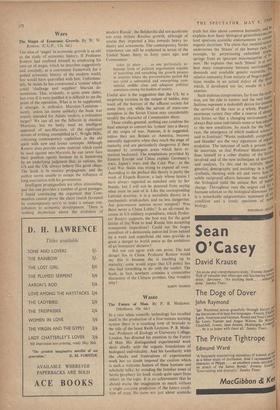Wars
The Stages of Economic Growth. By W. W. Rostow. (C.U.P., 12s. 6d.)
THE idea of 'stages' in economic growth is as old as the study of economic history. If Professor Rostow had confined himself to employing his own set of stages, which he describes suggestively and concisely, as a convenient framework for a potted economic history of the modern world, few would have quarrelled with him. Unfortuna- tely, he insists he has constructed a 'system' which could 'challenge and supplant' Marxist de- terminism. This, evidently, is quite some claim, but even if it were justified it is difficult to see the point of the operation. What is to be supplanted, it emerges, is orthodox Marxism / Leninism— surely, unless (as seems unlikely) the book was mainly intended for Asiatic readers, a redundant target? We can all see the fallacies in classical Marxism, but we badly need an intelligent appraisal of neo-Marxism, of the- significant stream of writing, exemplified in C. Wright Mills, criticising contemporary capitalism in the old spirit with new and looser concepts. Although Rostow does provide some material which could be used against neo-Marxists, he can never face their position openly because he is hamstrung by an underlying judgment that, as nations, the US and the UK always behave like good chaps. The book is in essence propaganda, and the author seems unable to escape the influence of long association with his government.
Intelligent propagandists are often stimulating, and this one provides a number of good passages. I found convincing the argument that Com- munism cannot prove the claim (much favoured by contemporary neo's) to make a unique con- tribution to economic development. 'There is nothing mysterious about the evolution of modern Russia'; the Bolsheviks did not accelerate nor even initiate Russian growth, although of course they imparted a bias towards heavy in- dustry and armaments. The contemporary Soviet experience can still be explained in terms of the United States thirty to forty years ago, and Communism takes its place . . . as one particularly in- humane form of political organisation capable of launching and sustaining the growth process in societies where the pre-conditions period did not yield a substantial and enterprising com- mercial middle class and adequate political consensus among the leaders of society.
Useful also is the suggestion that the US, by a surprising increase in the output of babies, may ward off the horrors of the affluent society for some time yet, while the advent of mass-con- sumption in the Soviet Union may considerably modify the character of Communism there.
These credits granted, nothing can condone the final attempt to convert his `system' into a theory of the origin of war. Nations, it is suggested, unless they are Britain or America, become naturally aggressive when they reach the stage of maturity and are particularly dangerous if then tempted by contingent areas which have re- mained backward. The temptations provided by Eastern Europe and China explain Germany's wars, Japan's wars and the Cold War : in the Cold War Stalin was trying to expand all over. According to the preface this theory is partly the work of Elspeth Rostow, a lady whose brains I have always regarded as matched only by her beauty, but I will not be deterred from saying what must be said of it. Like the corresponding Leninist doctrine, it is a moralistic theory in a mechanistic strait-jacket, and no less dangerous. Are post-mature nations never tempted? Was there never a China Lobby? Is an all-round in- crease in US military expenditure, which Profes- sor ROStOW supports, the best way for the good fairies of the West to lead Russia into accepting armaments inspections? Could not the bogus moralism of a democratic nation led from behind by a weak and superficial old man provide as great a danger to world peace as the ambitions of an 'immature' dictator?
But one can agree with one point. The real danger lies in China. Professor Rostow would say this is because she is reaching up to maturity; some would argue that US policy has also had something to do with the matter. The book, in fact, nowhere contains a consecutive discussion of the Chinese problem. One wonders why?
ROBIN MARRIS






































 Previous page
Previous page